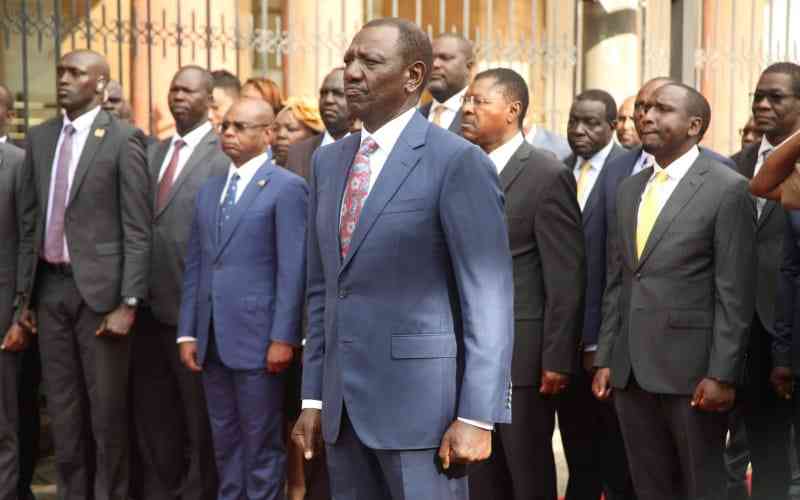A Kenya Pipeline Company (KPC) team comprising of a medical doctor received a hostile reception over the weekend at Thange location in Makueni County after playing down the effects of massive oil spillage in the area.
While addressing the residents at Thange primary school during a sensitisation forum organised by KPC on how to cope with the leaked oil, Dr Tom Menge, a toxicologist based at Kenyatta National Hospital said the oil products leaked in the area do not contain lead additives.
He told the residents that the leaked oil could only expose them to hydrocarbons whose side effects he said would be breathing problems and at worst pneumonia.
"In this case, lead poisoning is not a possibility," declared Dr Menge, provoking the wrath of the crowd which booed him and the team.
Curiously, Dr Menge and the KPC team did not have investigative report over the oil spill to share with the residents.
The community, led by their chairman John Mukai, complained that there was a calculated move to underestimate the dangers of the oil pollution and dupe them.
Their doubts were fuelled by advice issued earlier by agricultural officers not to consume or sell farm produce grown within the oil polluted area. Most of the crops are drying up.
"We object to these reports that are not based on any investigations. We cannot accept to be fooled that it is safe to consume petroleum," Mr Mukai told The Standard, adding that the company should compensate them for the economic losses.
KPC's communications officer Jason Nyantino said the medic spoke as an expert in poisons and how they affect human beings, adding that his mission was to sentisitise the public on symptoms to look out for in case one consumes petroleum products. He however said the company does not transport leaded fuel.
"We have forwarded samples taken from some residents to South Africa to test for lead and results are expected by early December," he said.
The visit by KPC comes one week after a senate committee on energy led by Baringo senator Gideon Moi visited the area and described the oil spillage as a huge environmental disaster.
The committee called for thorough investigations and medical screening of all the affected residents to establish if there are any incidences of poisoning.
A damning report prepared by Water Resources Management Authority (Warma), a copy of which we have, shows that water in River Thange and its surroundings is polluted with high levels of oil and grease, thus unsafe for domestic and livestock use.
"Based on the observations made during a site visit, it was evident that both surface and ground water resources were highly contaminated with petroleum oil as it took more than three months for KPC to contain the spillage after it was first detected," the report, signed by Mr Noel Ndeti, a senior water quality and pollution control officer, reads in part.
"This was further evidenced by oil seepage into boreholes downstream and collection of petroleum oil in abandoned wells located downstream of the pipeline," the report continues.
Stay informed. Subscribe to our newsletter
The report also notes that the atmospheric air within the polluted area "is highly odourous with petroleum product fumes."
After testing water from a borehole that supplies Thange secondary and primary schools, Warma established it was also contaminated with high levels of oil and grease. The borehole was thus condemned.
"Warma would pursue legal action against KPC for the abnormally long period taken to repair the leaks and the pollution of both surface and ground water," the report which also appeals to KPC to compensate the residents for "losses or damages" incurred states.
KPC has already contracted Societe Generale de Surveillance (SGS) Kenya Ltd to carry out Environmental, Social and Economic Impact Assessment, meant to establish the impact of the oil spill.
The company is also providing clean water to the two schools and the entire Thange community.
 The Standard Group Plc is a
multi-media organization with investments in media platforms spanning newspaper
print operations, television, radio broadcasting, digital and online services. The
Standard Group is recognized as a leading multi-media house in Kenya with a key
influence in matters of national and international interest.
The Standard Group Plc is a
multi-media organization with investments in media platforms spanning newspaper
print operations, television, radio broadcasting, digital and online services. The
Standard Group is recognized as a leading multi-media house in Kenya with a key
influence in matters of national and international interest.
 The Standard Group Plc is a
multi-media organization with investments in media platforms spanning newspaper
print operations, television, radio broadcasting, digital and online services. The
Standard Group is recognized as a leading multi-media house in Kenya with a key
influence in matters of national and international interest.
The Standard Group Plc is a
multi-media organization with investments in media platforms spanning newspaper
print operations, television, radio broadcasting, digital and online services. The
Standard Group is recognized as a leading multi-media house in Kenya with a key
influence in matters of national and international interest.






